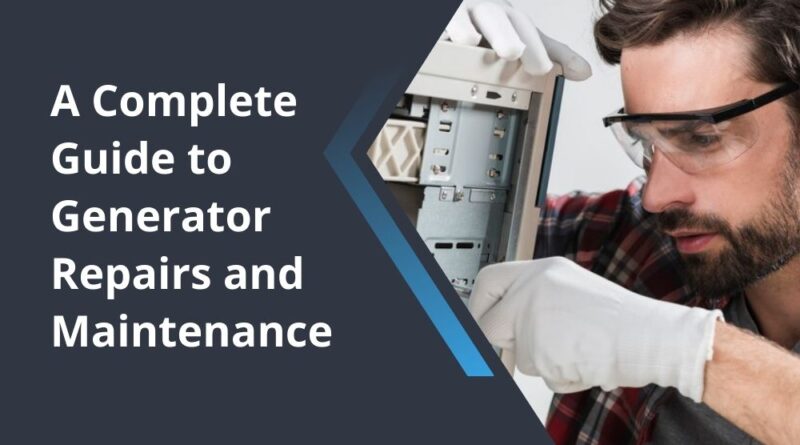A Complete Guide to Generator Repairs and Maintenance
Generators are invaluable tools that provide backup power during outages and emergencies. To ensure they function reliably when needed, proper maintenance and occasional repairs are essential. In this comprehensive guide, we’ll walk you through everything you need to know about Generator Repairs and Maintenance in simple terms.
Understanding Your Generator
Before diving into repairs and maintenance, it’s essential to understand the basic components and operation of your generator.
Types of Generators
- Portable Generators: These are small, mobile units typically used for powering a few essential appliances during short outages.
- Standby Generators: These larger, permanently installed units are connected to your home’s electrical system and automatically activate during power outages.
Common Generator Problems
Generators can experience a range of issues over time, from minor maintenance tasks to more complex repairs. Some common problems include:
- Fuel Issues: Stale fuel, clogged fuel filters, or improper fuel mixtures can cause starting and running problems.
- Battery Failure: The generator’s battery may fail to start the unit if it’s old or not properly maintained.
- Oil Leaks: Leaks can occur due to worn gaskets or seals, leading to reduced oil levels and potential engine damage.
- Overheating: Overheating can result from blocked airflow, low coolant levels, or a malfunctioning cooling system.
Regular Maintenance Tasks

Proper maintenance is key to ensuring your generator operates reliably when needed. Here are some essential maintenance tasks:
1. Regular Inspection
- Check for signs of damage or wear, including leaks, loose connections, and corrosion.
- Inspect the air filter and clean or replace it as needed to ensure proper airflow.
2. Oil and Filter Changes
- Change the oil according to the manufacturer’s recommendations, typically every 100 hours of operation.
- Replace the oil filter at the same time to ensure optimal engine performance.
3. Fuel System Maintenance
- Use fresh fuel and stabilizers to prevent fuel degradation and clogging.
- Regularly inspect and clean the fuel filter to ensure uninterrupted fuel flow.
4. Battery Maintenance
- Keep the battery terminals clean and free of corrosion.
- Test the battery regularly and replace it if it’s not holding a charge.
5. Cooling System Check
- Inspect the coolant level and top it up if necessary.
- Clean the radiator and cooling fins to prevent overheating.
Troubleshooting and Repairs
Despite regular maintenance, generators may still encounter problems that require repairs. Here are some troubleshooting steps and common repairs:
1. Starting Issues
- Check the fuel level and quality, ensuring it’s not stale or contaminated.
- Inspect the spark plug for fouling or damage and replace it if necessary.
2. Low Power Output
- Verify that the generator is properly sized for the load it’s powering.
- Check for clogged air filters or exhaust restrictions that may impede airflow.
3. Engine Overheating
- Inspect the cooling system for leaks, low coolant levels, or blockages.
- Clean or replace the radiator and cooling fins to improve airflow.
When to Call a Professional
While some maintenance tasks can be performed by DIY enthusiasts, certain repairs are best left to professionals. Consider calling a technician if you encounter:
- Electrical issues or wiring problems.
- Engine problems such as excessive smoke or knocking sounds.
- Any repairs beyond your comfort level or expertise.
Choosing a Reliable Service Provider
When selecting a service provider for generator repairs and maintenance, consider the following factors:
- Experience: Look for a company with years of experience and a proven track record of quality service.
- Certifications: Ensure the technicians are certified and trained to work on your specific generator model.
- Customer Reviews: Read online reviews and testimonials from past customers to gauge the company’s reputation and customer satisfaction.
Conclusion
Regular maintenance and occasional repairs are essential for ensuring your generator operates reliably when needed most. By understanding common problems, performing regular maintenance tasks, and knowing when to call a professional, you can keep your generator in top condition and enjoy peace of mind during power outages and emergencies. With proper care, your generator will continue to provide backup power for years to come.
Note :- To Read More Articles Visit on techybusinesses.

